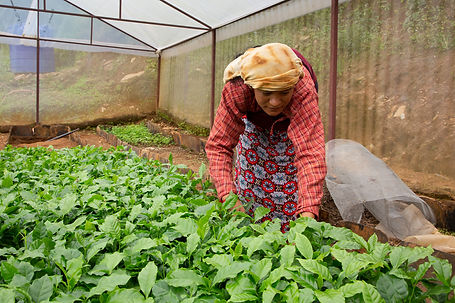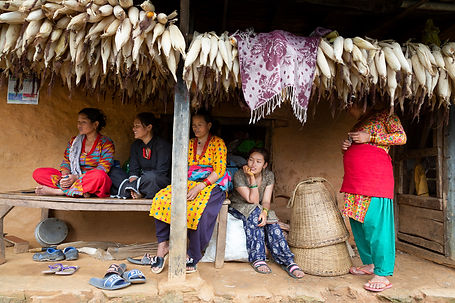ASIA : Improving women's condition in Rasuwa district
Laxmi is just 20 years old. She proudly hands us her phone to show us her latest production of mushrooms, shiitake. Pictures taken a few weeks ago. In the two greenhouses, the hanging nets that were supposed to hold the 58 wooden cylinders are now empty. There is nothing left, all the mushrooms have been sold. “After three productions, I have to replace them. In total I have earned 70,000 rupees (500 euros)! This money will be used to continue my studies.”


Shiitake for studies
Until a year ago, Laxmi had never heard of growing shiitake in a greenhouse. By chance, she learned that the Italian NGO ASIA (Association for international solidarity in Asia) was going to set up this new project in her village of Saramthali, in the Rasuwa district, in the buffer zones of the Langtang National Park. She was immediately interested. A few days of training with the local staff, the construction of two greenhouses, the installation of wooden cylinders, fertilizer and mycelium will follow. Only natural products, available in the immediate environment. “During the training, they emphasized on preservation of the environment, says Laxmi. The work is not too difficult, I just have to check the temperature and humidity every day, and act if necessary."
Her three productions have been sold in the neighbouring villages, but also to the municipality. The demand is very high. Laxmi is thinking bigger: “I would like to use part of the profits to invest in 200 cylinders! And since I have learned how to build a greenhouse, I can do it myself.”
Growing mushrooms is just one of the projects initiated by the NGO. ASIA intervened in the first hours after the terrible earthquake of 2015 in order to provide for basic needs (distribution of blankets, shelters, ...) and has remained in the region ever since. Over the years, various projects have been set up in several Tamang villages in the district, in partnership with local authorities. “We work on a small scale, we make sure that we meet the needs of the communities, which means a lot of dialogue, explains Nabaraj Acharya, programme manager. Our priority is to work with women, who are often the most marginalised.”




100% natural coffee
A little further up the village, several women have met at Jamu's house. The collective nursery is on her plot, on the edge of her house. Asmita, Angela, Subika, all grow coffee plants, another product with great commercial potential. This project was born a year ago. “We are still at the beginning, at the time of the first fruits, I am well aware that we will have to be patient but I am confident, I know that coffee sells very well”, explains Asmita, who has 50 plants. Like the fourteen other women in the project, she bought them from ASIA. At 5 rupees each, while the usual price is 5 times higher, at 25 rupees each. Still, it is important for the NGO that they do not receive them for free, to ensure their responsibility.
All of them have also received training. How to plant coffee, how deep to plant, how far apart to plant, where to put them, how to maintain them, etc. The local staff provides regular follow-up. Environmental protection is also an integral part of the training. There is no question of pesticides here, fertilisers are exclusively organic. The group also learns about land law, marketing and financial management. “My 50 coffee plants are in cherry for the first time. I could sell them as they are, but if I process them and sell the beans, I will earn much more” says the highly motivated and enterprising Asmita.




Enhancing women's status
Coffee growing is certainly an addition to their countless daily tasks. They already have to juggle with the traditional crops of maize, millet and rice, as well as domestic chores and raising their children. The life of a woman is not simple in the villages of Rasuwa district! Especially since most of the husbands have left to work in cities, sometimes at the other end of the country, when they are not in the Gulf States. “This financial support is essential for us, says Angela. Often the traditional crops only allow us to last 6 months. But above all, this money will be used for my children. I want them to be able to go to school, especially my daughters. And I want them to learn a trade. I didn't have that chance.”
All these women say the same thing, regardless of the village. Whether they grow mushrooms, coffee, a vegetable garden, fruit trees, or have started beekeeping. Money for their children. But also to finally feel valued. “A year ago I didn't even dare to speak with a stranger, not even to say my name, I was too shy. Today I feel more independent, more confident in my possibilities, I am able to express what I need.”

